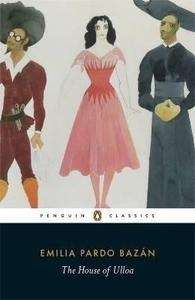The House of Ulloa

Editorial Penguin UK
Fecha de edición agosto 2013 · Edición nº 1
Idioma inglés
EAN 9780141392950
288 páginas
Libro
encuadernado en tapa blanda
Resumen del libro
A rich and unforgettable tragic-comic novel of sexual intrigue and political scheming, The House of Ulloa is one of the greatest works of nineteenth-century Spanish literature. The House of Ulloa follows pure and pious Father Julian Alvarez, who is sent to a remote country estate to put the affairs of the marquis, an irresponsible libertine, in order. When he discovers moral decadence, cruelty and corruption at his new home, Julian's well-meaning but ineffectual attempts to prevent the fall of the House of Ulloa end in tragedy.
Combining gothic elements with humour and social satire, The House of Ulloa is the finest achievement of Emilia Pardo Bazan, a prolific writer, feminist, traveller and intellectual, and one of the most dynamic figures of her time. Brilliantly balancing biting satire, gothic undertones and the rich sense of place of a Hardy or Zola, this is a wonderful novel that fully deserves to be ranked with the other great books of the period. The Countess Emilia Pardo Bazan was born in 1851 and married at sixteen.
After separating from her husband, she embarked on an affair with novelist Benito Perez Galdos. The House of Ulloa (1886) is generally considered as her masterpiece among her many literary works. Professor Paul O'Prey is Vice-Chancellor of the University of Roehampton, London.
Lucia Graves has translated works by Robert Graves, Anais Nin, Katherine Mansfield and Carlos Ruiz Zafon, and is the author of a memoir, A Woman Unknown, and a novel, The Memory House. "Pardo Bazan's mastery of social types and of the political currents that swirled around the liberal revolution are unsurpassed in Spanish literature...O'Prey and Graves ...avoid awkward literalisms while nonetheless remaining true to the spirit of the original". (New Criterion).
Biografía del autor
Emilia Pardo-Bazán y de la Rúa-Figueroa (La Coruña, 16 de septiembre de 1851-Madrid, 12 de mayo de 1921), condesa de Pardo Bazán, fue una novelista, periodista, ensayista, crítica literaria, poetisa, dramaturga, traductora, editora, catedrática y conferenciante española introductora del naturalismo en España.








